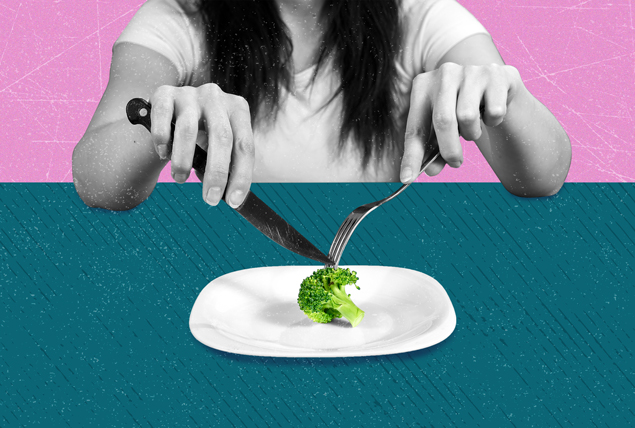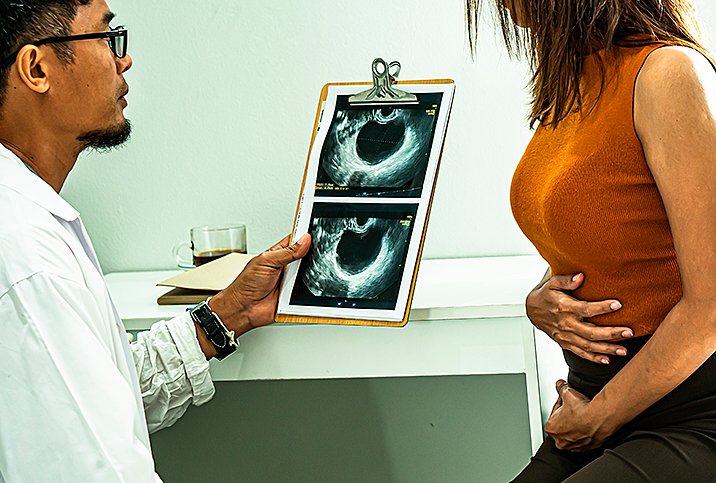Women With PCOS Are Three Times More Likely to Have Eating Disorders

Polycystic ovary syndrome (PCOS) can profoundly impact a woman's health and quality of life. PCOS is a primary cause of female infertility, acne and irregular menstruation, but its effects are often broader.
Unusual symptoms of PCOS include gaining weight in spite of a healthy diet, unwanted hair growth or excessive hair (hirsutism), and painful periods. Women with PCOS also appear to have a higher prevalence of developing eating disorders, being three times more susceptible than people without it, according to a 2016 study.
Here's a look at how PCOS can make people more vulnerable to disordered eating or binge episodes, and how to manage symptoms for better mental and physical health.
Does PCOS cause weight gain?
It's unclear if PCOS directly contributes to overweight or obesity, said John Rinehart, M.D., who specializes in reproductive endocrinology, infertility and obstetrics, and gynecology at Rush University in Chicago.
Research has demonstrated an association between PCOS and weight gain, but correlation does not equal causation.
Classic PCOS or insulin-resistant PCOS affects 70 percent of people with PCOS.
However, experts said the emotional and physiological effects of PCOS can impede weight management. For one, women with PCOS tend to have a higher incidence of conditions such as anxiety, depression, distorted body image, sleep problems and eating disorders. All of these can affect a person's activity levels and eating habits, according to Thaïs Aliabadi, M.D., an OB-GYN and the founder of weight-loss practice Trimly in Beverly Hills, California.
Certain types of PCOS—there are four different types—may lead to metabolic dysfunction, making people more susceptible to weight gain.
Insulin-resistant PCOS
Classic PCOS or insulin-resistant PCOS affects 70 percent of people with PCOS and often accompanies prediabetes, diabetes or metabolic syndrome. People with insulin-resistant PCOS don't respond to insulin normally and can't properly regulate blood glucose levels.
The pancreas releases more insulin to compensate, which stimulates the body to store more fat and produce more androgens, which can exacerbate obesity, Aliabadi said. And excess fat (adipose) tissue worsens insulin resistance.
Overproduction of insulin contributes to a hormonal drive to eat more carbohydrates, which are often calorie-dense, according to Jessica Folek, M.D., the chair of bariatric surgery at Northwell Long Island Jewish Forest Hills in New York City.
Post-pill PCOS
This is a temporary form of PCOS. It occurs when someone discontinues using drospirenone or cyproterone birth control pills, which causes an increase in androgen hormones.
Inflammatory PCOS
Chronic inflammation can prompt the ovaries to produce excess testosterone. While all women with PCOS have chronic inflammation, it's the main contributing factor for people with this type.
Adrenal PCOS
Most people with PCOS have excessive amounts of all the androgen hormones, including testosterone, androstenedione and dehydroepiandrosterone sulfate (DHEAS).
People who only have too much DHEAS, a sex hormone produced by the adrenal glands, have adrenal PCOS.
What are the signs of insulin resistance in PCOS?
If you have insulin resistance but your pancreas can produce enough insulin to balance blood sugar levels, you may not have any symptoms, according to Cleveland Clinic. Eventually, insulin-producing cells in the pancreas wear out, leading to high blood sugar and symptoms that may include:
- Increased thirst
- Increased urination
- Increased appetite
- Slow-healing wounds
- Vaginal infections, such as yeast infections
- Blurry vision
- Headaches
What is PCOS belly?
Some women with PCOS accumulate a disproportionate amount of visceral fat in their lower abdomen, colloquially known as a "PCOS belly," said Priya Jaisinghani, M.D., a clinical assistant professor in the department of medicine at NYU Grossman School of Medicine in New York City.
People of all body shapes and sizes can develop PCOS belly, including people with an average or below-average body mass index (BMI).
Dealing with the physical effects of PCOS, such as weight gain, facial hair or acne, can take a toll on young women.
Visceral fat is located deep within the body, surrounding the abdominal organs. Subcutaneous fat resides just below the skin. Due to that difference, a PCOS belly is typically firm to the touch.
It's unclear what causes PCOS belly, according to Jaisinghani, but it's likely a result of insulin resistance and other hormonal and metabolic issues.
What are the risk factors for people with PCOS to develop an eating disorder?
The link between PCOS and eating disorders is complex and ambiguous. People with PCOS typically have a number of risk factors, according to Courtney Crisp, Psy.D., a licensed clinical psychologist and eating disorder specialist in San Rafael, California. These include:
- Body dissatisfaction
- Eating and weight concerns
- Restraint
- Overeating
- Depressive symptoms
- Being in a larger body
Research suggests insulin resistance and sleep disturbances associated with PCOS may contribute to certain disorders. Control is often another major component.
"In the development of eating disorders, control is often a central dynamic," Crisp said. "It is possible that if women with PCOS feel they have less control over their bodies due to PCOS symptoms, disordered eating may follow."
Obesity
Research indicates between 38 percent and 88 percent of women with PCOS are overweight or obese, according to a 2019 report.
People with PCOS experience weight gain in areas that include the abdomen and hips, but they may also find their face shape changes. Additionally, obesity-related insulin resistance can increase the risk of fat deposits in the liver, which can lead to fatty liver disease, Jaisinghani said.
Dieting, restriction and exercise are commonly prescribed to help people with PCOS lose weight and improve insulin sensitivity. However, this can increase a person's risk of an eating disorder, said Holly Willis, M.S.N., a psychiatric nurse practitioner and eating disorder specialist at the Renfrew Center's Atlanta location.
"Engaging in any form of eating that is not intuitive and enjoyable increases the risk for developing an eating disorder and disrupting one's relationship with food," Willis said.
Depression
The effects of PCOS on your mental health can be profound. Studies suggest between 27 percent and 49 percent of people with PCOS have depression, compared to about 19 percent of people without PCOS.
There's a strong correlation between mood disorders, such as depression and anxiety, and eating disorders. Major depressive disorder (clinical depression) is one of the most common conditions to co-occur with PCOS. About 50 percent to 75 percent of people with eating disorders experience depression, according to the National Institute of Mental Health.
Can people with PCOS get anorexia?
"Dealing with the physical effects of PCOS, such as weight gain, facial hair or acne, can take a toll on young women," Aliabadi said. "I see young patients in my office all the time who turn to disordered eating in order to cope."
Often, people with PCOS try dieting and excessive exercise with little or no results, Aliabadi continued. As a result, they may develop eating disorders, including anorexia, to feel some sense of control.
However, while people with PCOS can develop anorexia nervosa, they're more likely to have the following health conditions, a 2016 study suggested:
- Bulimia nervosa (6.1 percent) is characterized by bingeing and purging through self-induced vomiting, laxatives or excessive exercise.
- Binge eating disorder (17.6 percent) is regularly, compulsively consuming large amounts of food in a short period of time, often to the point of discomfort or pain.
- Night eating syndrome (12.9 percent) means people are consuming at least 25 percent of their daily calories after dinner, usually during the night, and feel as though they need to eat to sleep.
Experts suggested the prevalence of these eating disorders may be due to cravings associated with PCOS, as well as a response to restrictive dieting.
"Both bulimia and binge eating typically involve bingeing behaviors that are actually rooted in restriction," said Cherie Miller, L.P.C.-S., an eating disorder psychotherapist in the Dallas-Fort Worth area. "Night eating can also be caused by not getting enough calories during the day. If you're not eating enough, you're going to feel more compelled on a physiological level to eat, because our bodies don't like to be in an energy deficit and fight back against that."
It's all part of the human body's defense responses to undereating. These include changes in metabolism and hormones, which can lead to increased hunger and cravings, according to Miller. And those are on top of the cravings a person with PCOS might already experience.
What is disordered eating behavior?
In order to understand disordered eating, Crisp said it's helpful to define normative eating. The latter entails mindfully eating when hungry and stopping when satiated or full, according to the National Eating Disorders Association (NEDA).
In contrast, disordered eating includes behaviors that interfere with normative eating, such as bingeing, purging, restricting or skipping meals. Disordered eating can become an eating disorder when the behaviors are consistent and interfere with your well-being and ability to function.
Some disordered eating behaviors common in people with PCOS include emotional eating, external eating and restrained eating.
Emotional eating
Emotional eating entails eating when you're emotionally distressed and seeking comfort, Willis said, noting people with PCOS who have anxiety or depression are especially likely to seek solace in food.
The biggest issue with emotional eating is that it's an ineffective means of meeting emotional needs. Nearly everyone emotionally eats from time to time, Miller said. But if it's your primary way of coping with uncomfortable emotions, it might be time to seek help.
External eating
External eating is problematic because it involves eating regardless of fullness or satiety, Willis said.
"People with PCOS may be at greater risk of external eating due to insulin alteration leading to cravings for foods, especially carbohydrates, that can be triggered by the sight or smell of foods," she continued, adding that emotional and external eating commonly co-occur.
Restrained eating
Restrained eating is known as restriction, Willis said. Because people with PCOS are often advised to lose weight through dieting, they can be at risk of restrained eating behaviors. This can increase anxiety and obsessiveness around food, which can lead to an eating disorder.
Can PCOS be cured?
There is no cure for PCOS, but medication and lifestyle adjustments can help to alleviate symptoms.
"Treatment for PCOS is dependent on the patient and what symptoms concern them. The first line of treatment is always diet and exercise, which improves insulin sensitivity, in addition to other treatment options including hormonal birth control, medications that work on insulin resistance or anti-androgen medications to reduce physical symptoms of high testosterone," Aliabadi said. "These treatments can all indirectly help with weight management."
Is there a medicine for PCOS weight loss?
Currently, no drugs are specifically designed to facilitate weight loss in PCOS patients. In certain circumstances, however, people with PCOS can use weight-loss medication to control insulin and appetite, thereby supporting a healthy body composition.
One of these drugs, Mounjaro (tirzepatide)—billed as the next Ozempic—is primarily designed to help people with type 2 diabetes manage their blood sugar levels. But it and the drugs like it are famous for their ability to seemingly melt away pounds.
While it is important to promote weight management in people with PCOS, their is potential harm in overemphasizing the importance of weight loss.
Metformin, another diabetes management medication, is more frequently prescribed for PCOS because it can improve ovulation and insulin sensitivity, Folek said. It may support weight loss, though the results are generally moderate compared to the "significant" weight loss associated with drugs like tirzepatide and semaglutide.
Patients using metformin lost an average of six pounds after taking the drug for a year, according to a 2012 study.
Ozempic, metformin and Mounjaro can be prescribed to people with PCOS who have type 2 diabetes, Aliabadi said. And drugs like Wegovy and Saxenda, which are FDA-approved for weight loss, can be prescribed to people with PCOS who are overweight, particularly if they have insulin resistance.
Foods to avoid when taking metformin for PCOS
Because metformin is a frontline treatment for PCOS, people need to understand its side effects. These can include nausea, stomach aches, gas, bloating and diarrhea, according to the University of Colorado.
You'll need to avoid certain foods that can diminish metformin's effectiveness, according to the NHS. Foods to avoid while taking metformin include:
- Foods high in added sugar, such as chocolate, sweets and cookies
- Sugar-sweetened beverages, such as fruit juice and carbonated sodas
- Karela, which is used to flavor certain foods, such as bitter gourd masala
Karela can lower your blood sugar, making it more difficult to manage
What is the best birth control pill for PCOS weight loss?
When selecting birth control for PCOS, the goal is usually to assuage symptoms of elevated androgen hormones and regulate menstrual cycles, Rinehart said.
Generally, Aliabadi said, combined estrogen-progestin oral contraceptives (COCs) are recommended. However, for people who are overweight or obese, progestin-only methods are usually preferred because COCs and excess weight can raise the risk of blood clots.
Doctors tend to suggest progestin-only options for people with prediabetes or diabetes.
Some people take progesterone for PCOS weight loss. Though research has produced mixed results, some studies suggest progestin-only contraceptives are less likely to contribute to weight gain.
The bottom line
PCOS can affect various facets of health, from reproduction and body composition to negative body image and lowered emotional well-being. While it can't be cured, it is highly treatable.
If you have PCOS and are concerned about your weight, disordered eating behavior or both, speak with a weight-inclusive dietician and medical provider who advocates for health at every size, Willis said. These providers are less likely to prescribe restrictive diets, which can lead to or exacerbate problematic eating.
If you have an eating disorder or mental health condition, seek specialized treatment from medical professionals.
"Pursuing weight loss is a double-edged sword. While it is important to promote weight management in people with PCOS given its positive impact on insulin sensitivity and reproductive function, the potential harm in overemphasizing the importance of weight loss cannot be ignored," Willis said.


















